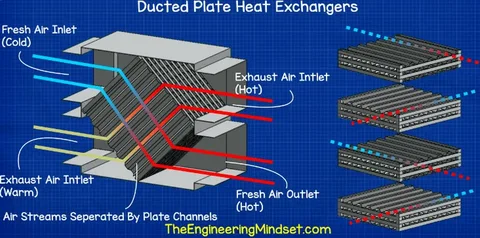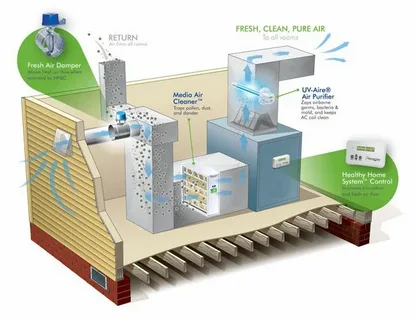Most of us take for granted the air we breathe indoors. We don’t usually think about the air quality or how it can affect our health and well-being. But the truth is that the air inside our homes and workplaces can be far more polluted than the air outside, which is why investing in a fresh air-ventilation system is so important. This blog post’ll discuss why fresh air ventilation system is so important and how it can help you breathe better and lead a healthier life.
Understanding Indoor Air Quality
Indoor air quality refers to the air pollution level within a building, such as homes, offices, schools, and other public spaces. Poor indoor air quality can negatively affect human health, productivity, and comfort.
Many factors can contribute to indoor air pollution, such as chemicals from cleaning products, building materials, and furniture, as well as biological pollutants like dust mites, pet dander, and mould. Without proper ventilation, these pollutants can accumulate in the air and cause health issues like allergies, respiratory problems, and headaches.
It is essential to understand indoor air quality and take measures to improve it, especially in today’s world, where people spend most of their time indoors. Installing a fresh air-ventilation system can help reduce indoor air pollution by introducing fresh outdoor air into the building while removing stale indoor air. With the help of a fresh air-ventilation system, you can ensure that your indoor air quality is healthy and safe to breathe.
The Negative Effects of Poor Air Quality
Poor indoor air quality can lead to various negative effects on human health, such as respiratory issues, allergies, headaches, and fatigue. If the air in your home or business is not ventilated properly, it can accumulate harmful pollutants, including dust, mould, and allergens. Inadequate ventilation can also increase carbon dioxide levels, which can cause drowsiness, dizziness, and headaches.
Moreover, indoor air pollutants can be especially problematic for those with preexisting health conditions, such as asthma, COPD, and other respiratory disorders. Poor indoor air quality exposure can aggravate these conditions and even worsen their symptoms. Additionally, prolonged exposure to indoor air pollutants can have long-term effects on our health, such as lung cancer and heart disease.
It is, therefore, crucial to prioritize the ventilation of indoor spaces to ensure the health and safety of those who occupy them. Installing a fresh air-ventilation system effectively mitigates the negative effects of poor air quality.
Benefits of Fresh Air Ventilation
Fresh air ventilation has numerous benefits, both for your health and your home or business. Fresh air-ventilation is important because it brings in outside air while simultaneously expelling stale indoor air. Here are some of the benefits:
- Improved Indoor Air Quality: Fresh air-ventilation ensures that there is a constant supply of fresh, clean air inside your space, which helps to remove pollutants, allergens, and contaminants that can harm your health.
- Reduced Moisture and Humidity: Fresh air-ventilation helps to reduce humidity and moisture levels in your space. High humidity levels can lead to mould growth, which can cause respiratory problems.
- Energy Savings: Fresh air-ventilation can help you save on energy costs by reducing the need for air conditioning and heating systems. By introducing fresh air into your space, your HVAC system won’t have to work as hard to maintain comfortable temperatures.
- Increased Comfort: Fresh air-ventilation helps to maintain a comfortable temperature and humidity level in your space. It can also help to eliminate stuffiness, odours, and other unpleasant smells.
Overall, fresh air-ventilation is essential to a healthy and comfortable indoor environment. With proper installation and Maintenance, you can ensure that your space has a constant supply of fresh, clean air essential for your health and well-being.
Types of Air Exchangers
Several types of air exchangers are available on the market, each with its own advantages and disadvantages. The most common types of air exchangers are heat recovery ventilators (HRVs) and energy recovery ventilators (ERVs). HRVs transfer heat from the outgoing air to the incoming fresh air, making it more comfortable and energy-efficient.
ERVs go one step further and transfer moisture between the two air streams, helping maintain a balanced humidity level in the indoor environment. HRVs and ERVs are beneficial in cold climates where it’s important to retain heat.
Another type of exchanger is the supply-only ventilation system, which introduces fresh air into the indoor environment without removing any stale air. This type of system is best suited for homes or buildings with open flues or natural ventilation. An exhaust-only ventilation system removes stale air from the indoor environment but does not supply fresh air, making it important to pair it with a separate air supply system.
Choosing the right type of exchanger depends on various factors, such as climate, building layout, and budget. It’s important to consult with a professional to determine the best option for your specific needs.
How to Choose the Right Air Exchange System for Your Home or Business
Choosing the right air exchange system for your home or business can be overwhelming with the many options. Consider the following factors when making your decision:
- Airflow requirements: The amount of air exchange required will vary depending on the size of the space and the number of occupants.
- Efficiency: Look for a system with a high-efficiency rating to ensure maximum fresh air while minimizing energy costs.
- Filtration: The quality of the filters is crucial in capturing harmful pollutants and particles from the air.
- Noise level: Consider the system’s noise level, particularly if it will be installed in a residential setting.
- Control options: Determine if the system has adjustable control options like speed or humidity.
- Installation and maintenance: Ensure the system is easy to install and maintain to avoid costly repairs and replacements down the line.
By carefully evaluating these factors, you can select an air-exchange system that meets your unique needs and promotes healthy indoor air quality.
Installation and Maintenance of Air Exchange Unit
Once you have selected the right fresh air exchange unit for your home or business, it’s important to ensure it is installed and maintained properly. Proper installation is crucial to ensure that the system works effectively and efficiently. You should hire a professional HVAC contractor to install the system for you. They can ensure the system is properly installed and the air ducts are appropriately placed to distribute fresh air throughout your space.
Maintenance is also important to ensure that your air unit works optimally. Make sure to change your air filters regularly, as dirty filters can reduce the system’s efficiency. Regularly clean the air ducts and ensure they are free from blockages and debris. A regular maintenance schedule can prevent breakdowns and keep the system running efficiently, saving you money on energy costs.
If you have any questions or concerns about your air unit, don’t hesitate to contact your HVAC contractor for assistance. They can advise you on how to keep your system running smoothly and efficiently. You can enjoy the benefits of fresh air-ventilation for years by ensuring proper installation and maintenance.
 Fresh Air System for Home is durable
Fresh Air System for Home is durable
One of the most appealing features of a fresh air system for home is their durability. Unlike many other home appliances requiring constant repairs and replacements, air units are designed to withstand years of use without frequent Maintenance.
The primary reason for their durability is that they have fewer moving parts and require less energy than other HVAC systems. As a result, the wear and tear on these systems is minimal, and they are less likely to break down over time. Moreover, these units are designed to run continuously, ensuring that the air quality in your home or business remains consistently high.
Additionally, modern air-exchange systems have features that make them easier to maintain. Many have washable filters that can be easily cleaned and reused, reducing the need for expensive filter replacements. Also, some systems are equipped with self-cleaning modes that prevent mould and bacteria build-up within the unit.
A fresh air-ventilation system can provide excellent indoor air quality for many years with proper installation and maintenance. So, investing in a high-quality air unit is not just about improving air quality; it’s also about ensuring long-term reliability and savings.
FAQs
1. What is a fresh air-ventilation system?
A fresh air-ventilation system is a mechanical system that brings fresh outdoor air into a building and replaces the stale air indoors. It improves indoor air quality and can prevent the build-up of harmful pollutants.
2. What are the benefits of a fresh air ventilation system?
A fresh air ventilation system can improve indoor air quality, reduce the risk of respiratory illnesses, and eliminate odours and moisture. It can also improve energy efficiency and help lower energy bills.
3. What types of air exchangers are available?
Different types of air exchangers are available, including heat-recovery ventilators, energy-recovery ventilators, and exhaust-only ventilation systems. Each system has advantages and disadvantages and can be chosen based on your needs.
4. How do I choose the right air-exchange system for my home or business?
To choose the right air-exchange system for your home or business, consider the size of the building, the number of occupants, the level of outdoor pollution, and your budget. Consult with a professional to help you choose the best option.
5. How often should I maintain my air unit?
It is recommended to perform Maintenance on your air unit every six months to ensure that it is working effectively. Regular Maintenance includes cleaning the filters, inspecting the ductwork, and checking the motor.
Overall, investing in a fresh air-ventilation system can greatly benefit your indoor air quality and improve the health and well-being of you and your loved ones. Consult with a professional to find the best system for your needs.
Conclusion
Fresh air-ventilation is essential to maintaining good indoor air quality in your home or business. Investing in a quality exchanger can protect yourself, your loved ones, and your employees from the negative effects of poor air quality, including allergies, asthma, and other respiratory problems.
When selecting an air-exchange system, consider the size of your space, your ventilation needs, and your budget. Some of the most popular types of air exchangers include energy recovery ventilators, heat recovery ventilators, and natural ventilation systems.



